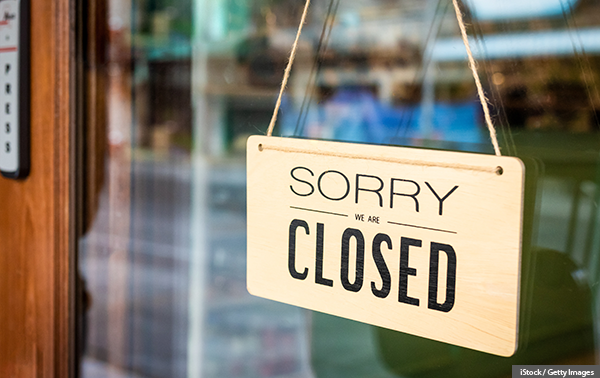Coronavirus: Business Closures And Restrictions
New measures to fight coronavirus require business closures and restrictions to trading businesses
To slow the spread of coronavirus (COVID-19), the Northern Ireland Executive has introduced measures which require that:
- all non-essential shops and community spaces must close
- people must not leave their home without a ‘reasonable excuse’, except for very limited purposes
- all gatherings of more than two people in public must stop
These steps enforce the restriction of movement and social distancing. The regulations came into effect at 11 pm on Saturday 28 March 2020.
The relevant authorities, including the police, have been given the powers to enforce the measures – including through fines and dispersing gatherings.
Non-essential premises that must close
To reduce social contact, the NI Executive has ordered the following businesses and venues to close:
- Cinemas.
- Theatres.
- Nightclubs.
- Bingo halls.
- Concert halls.
- Museums and galleries.
- Casinos.
- Betting shops.
- Spas.
- Nail, beauty, hair salons and barbers.
- Massage parlours.
- Tattoo and piercing parlours.
- Skating rinks.
- Indoor fitness studios, gyms, swimming pools, bowling alleys, amusement arcades or soft play areas or other indoor leisure centres or facilities.
- Funfairs (whether outdoors or indoors),
- Playgrounds, sports courts and outdoor gyms.
- Outdoor markets (except for stalls selling food).
- Car showrooms.
- Auction houses.
Non-essential businesses that may trade subject to restrictions
The NI Executive has ordered that the following businesses can trade with restrictions on what they may and must not do:
- Restaurants, including restaurants and dining rooms in hotels or members’ clubs.
- Bars, including bars in hotels or members’ clubs.
- Public houses.
- Cafes, including workplace canteens
Businesses that should continue to trade
The following types of businesses can continue to operate but are under a legal duty to follow social distancing measures.
- Food retailers, including food markets, supermarkets, convenience stores and corner shops.
- Off licences and licensed shops selling alcohol (including breweries).
- Pharmacies (including non-dispensing pharmacies) and chemists.
- Homeware, building supplies and hardware stores.
- Petrol stations.
- Car repair and MOT services.
- Bicycle shops.
- Taxi and vehicle hire businesses.
- Banks, building societies, credit unions, short term loan providers and cashpoints.
- Post offices.
- Funeral directors.
- Launderette and dry cleaners.
- Dental services, opticians, audiology services, chiropody, chiropractors, osteopaths and other medical and health services, including services relating to mental health.
- Veterinary surgeons and pet shops.
- Agricultural supplies shop.
- Storage and distribution facilities, including delivery, drop off or collection points, where the facilities are in the premises of the above businesses.
- Car parks.
- Public toilets.
Online retail remains open and postal and delivery service will run as normal.
Other businesses not specified
See further information at the link below, if your business is not specified in the lists:
- non-essential and must close
- non-essential and allowed to trade (subject to restrictions)
- allowed to trade (subject to restrictions)
Restrictions and closures of other services/premises
The NI Executive has ordered restrictions on what the following services/premise may and must not do:
- Provision of holiday accommodation, whether in a hotel, hostel, bed and breakfast accommodation, holiday apartment, home, cottage or bungalow, campsite, caravan park or boarding house.
- Place of worship.
- Community Centres.
Staying at home and preventing public gatherings
As well as the closure of all non-essential premises, the new measures also introduce restrictions on people’s movement requiring people to stay at home. No-one may leave their home without reasonable excuse
A reasonable excuse includes the need:
- to obtain basic necessities, including food and medical supplies
- to take exercise either alone or with other members of their household
- to seek medical assistance
- to provide care or assistance to a vulnerable person, or to provide emergency assistance
- to donate blood
- to travel for the purposes of work or to provide voluntary or charitable services, where it is not reasonably possible for that person to work, or to provide those services, from the place where they are living
- to attend the funeral of a family member.
All public gatherings of more than two people are also prohibited, except where the gathering is of a group of people who live together (for example, a parent talking their children to the shops if they can’t leave them at home) or where the gathering is essential for work purposes (but workers should be trying to minimise all meetings and other gatherings in the workplace).
The regulations state that no person may participate in a gathering in a public place of more than two people except:
- where all the persons in the gathering are members of the same household
- where the gathering is essential for work purposes
- to attend a funeral
In addition, all social events, including weddings, baptisms and other religious ceremonies, must stop. This excludes funerals, which can be attended by immediate family.




